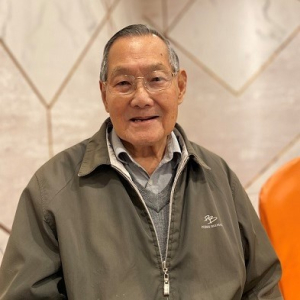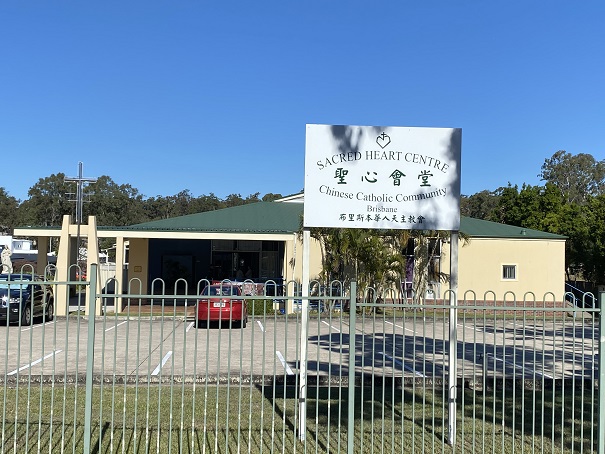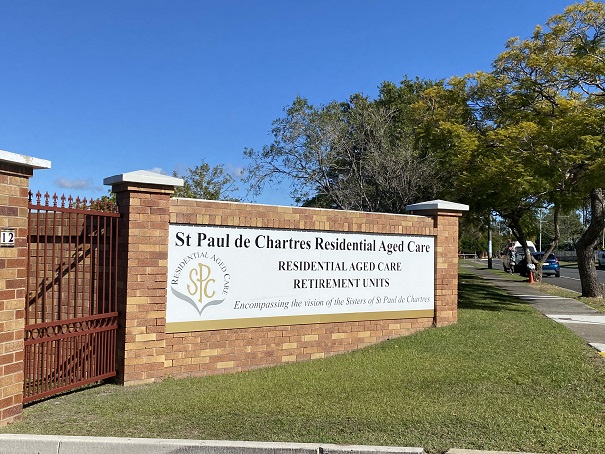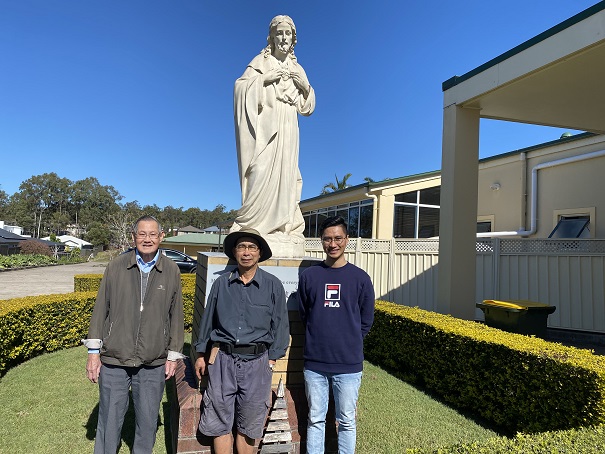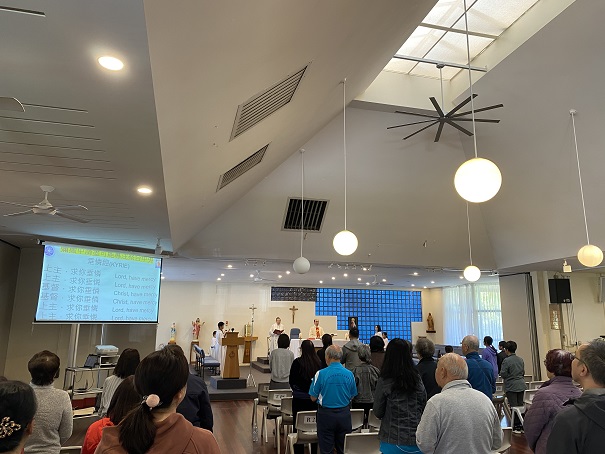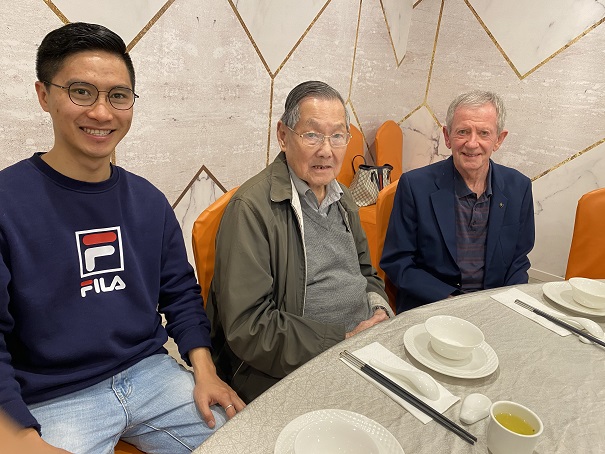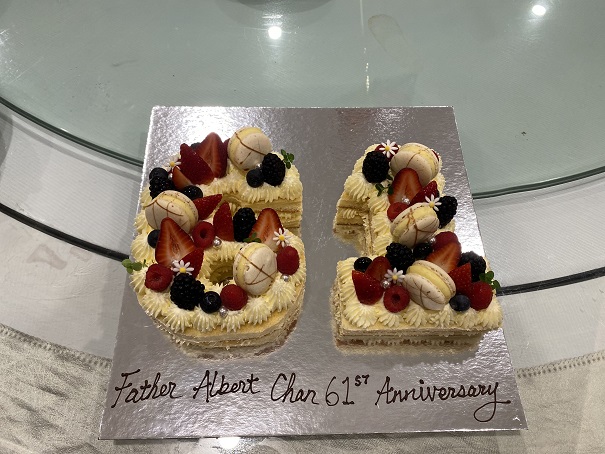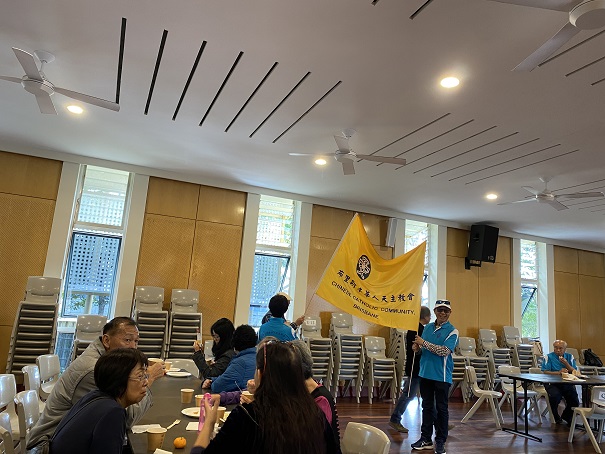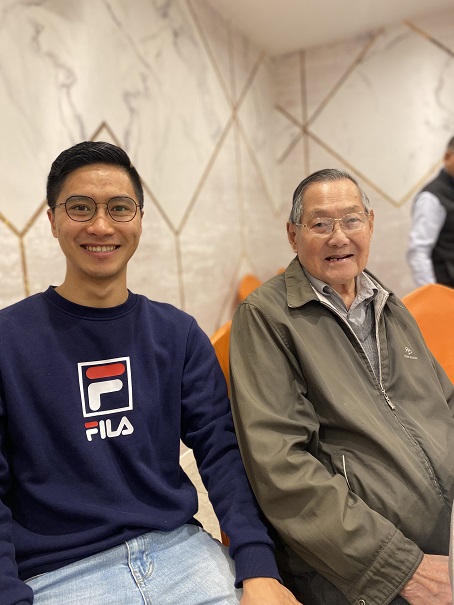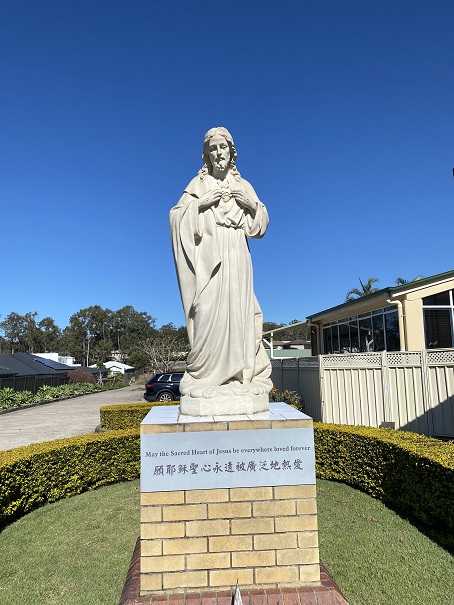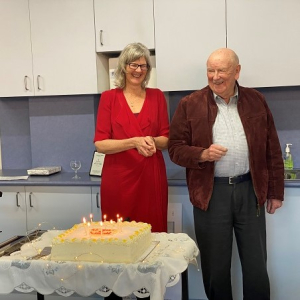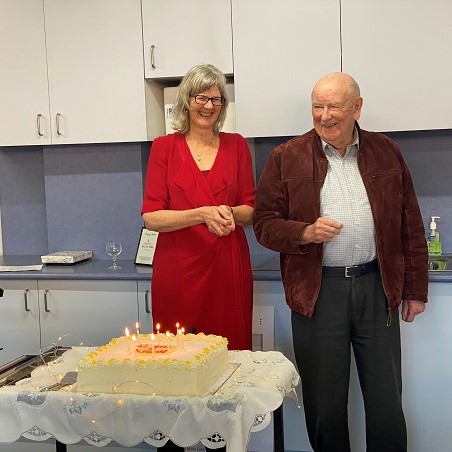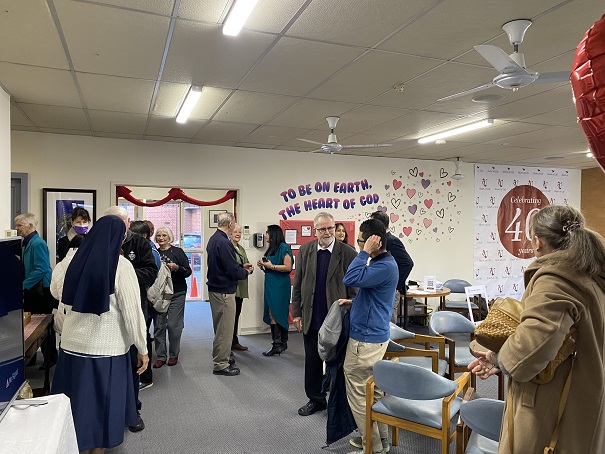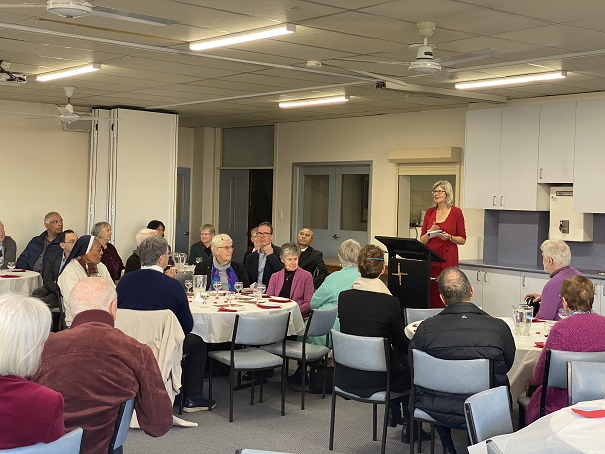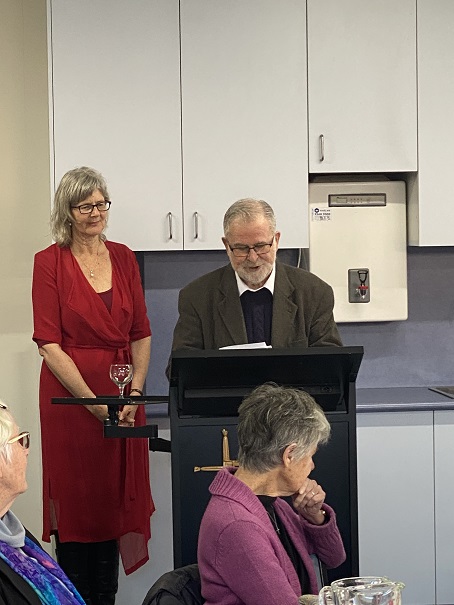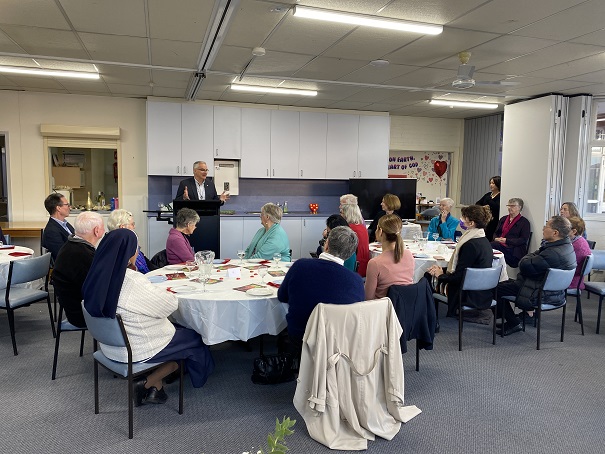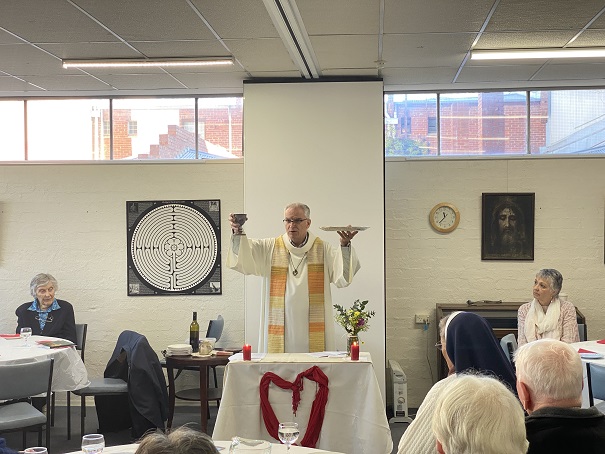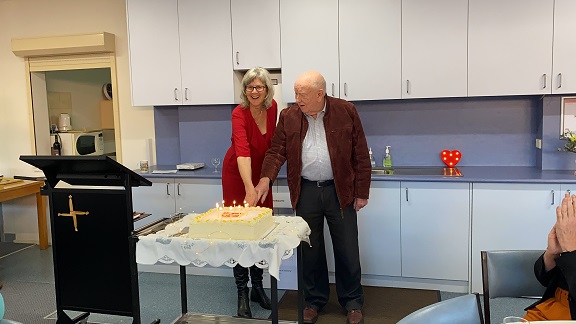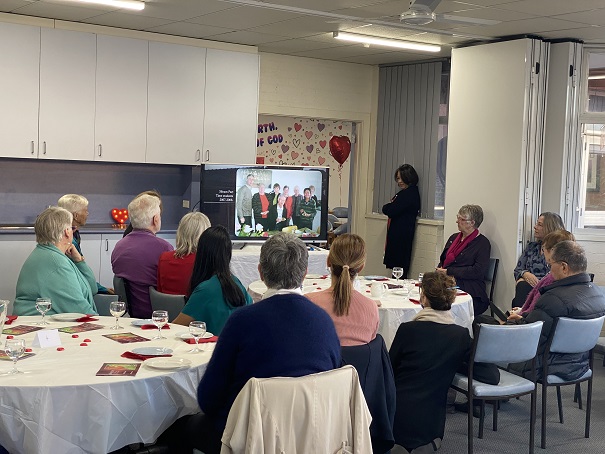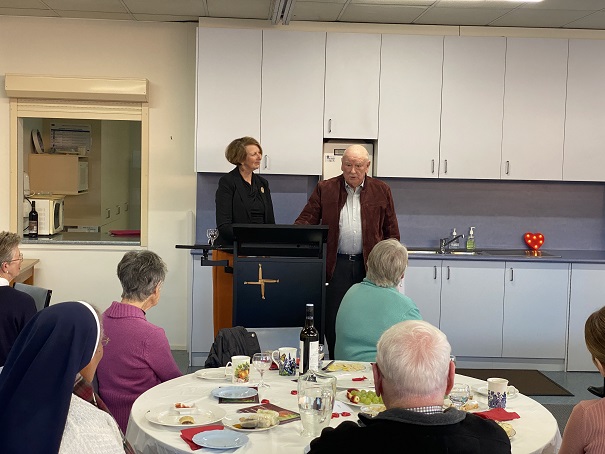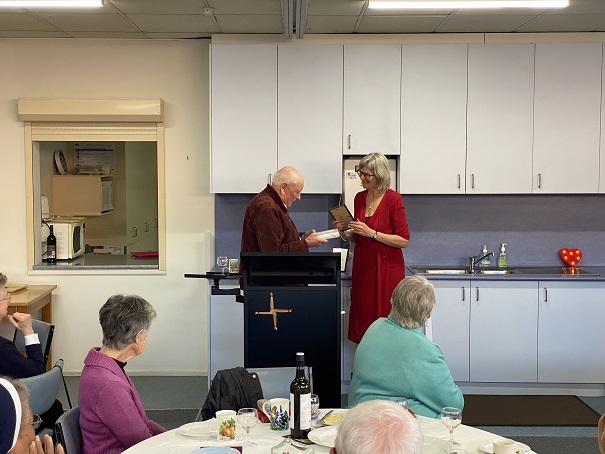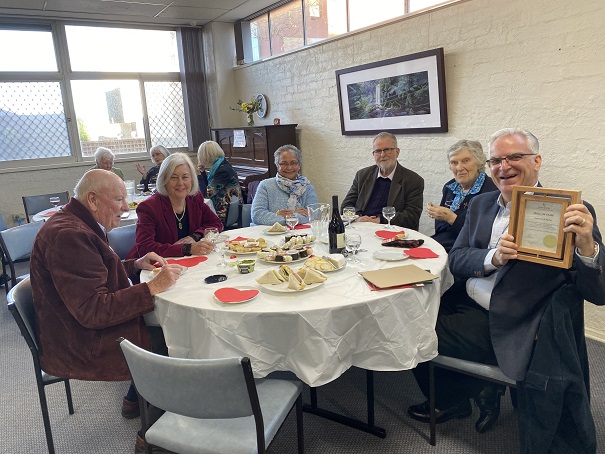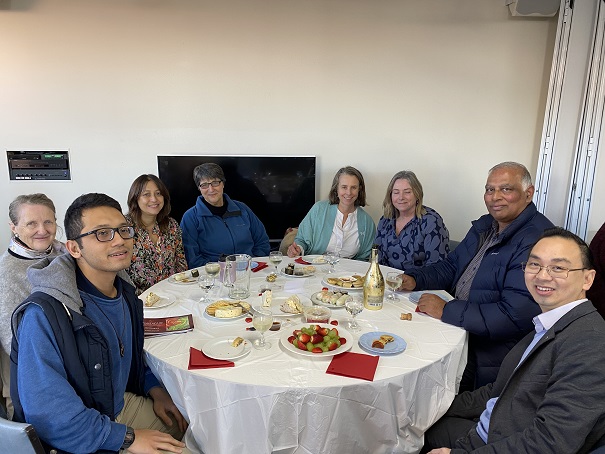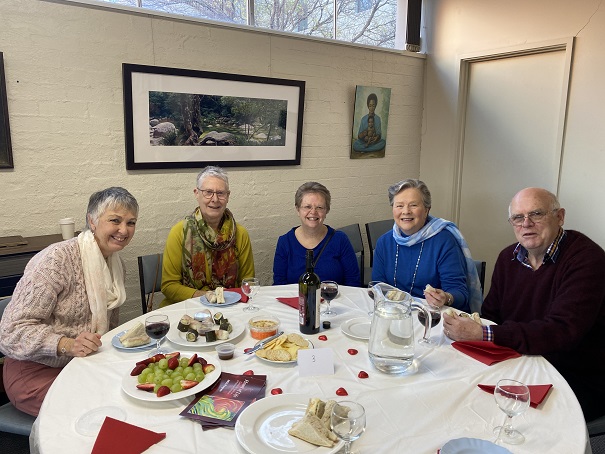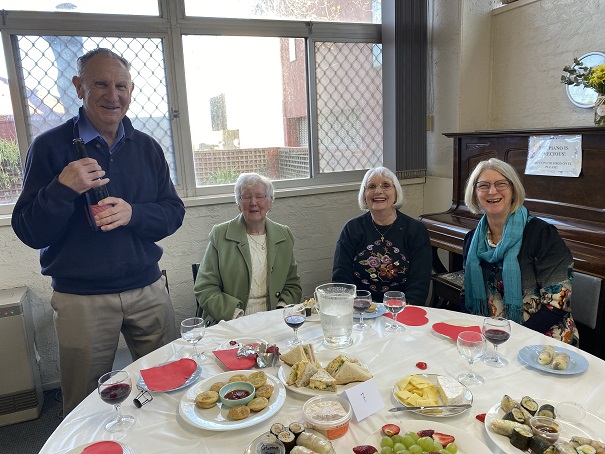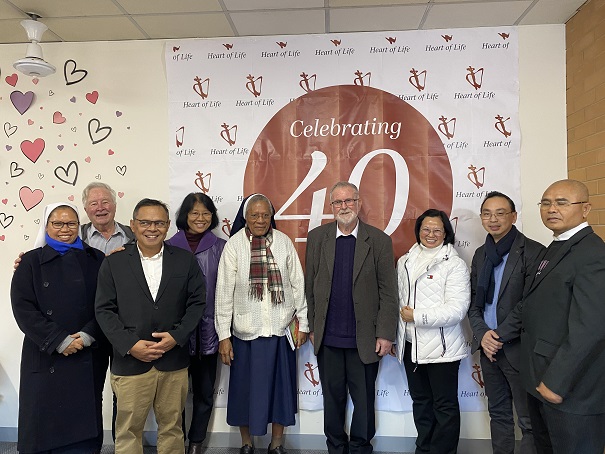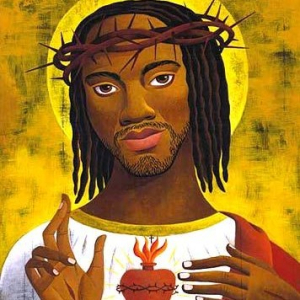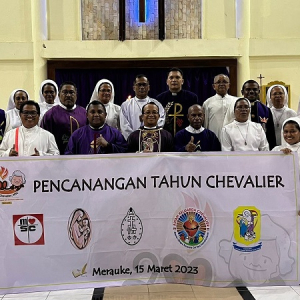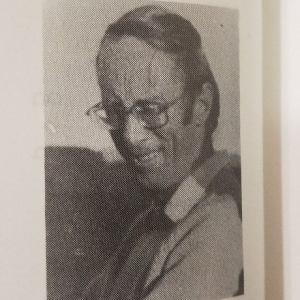Peter MALONE
A visit to Albert Chan MSC, Sacred Heart Chinese Community Centre
A visit to Albert Chan MSC, Sacred Heart Chinese Community Centre
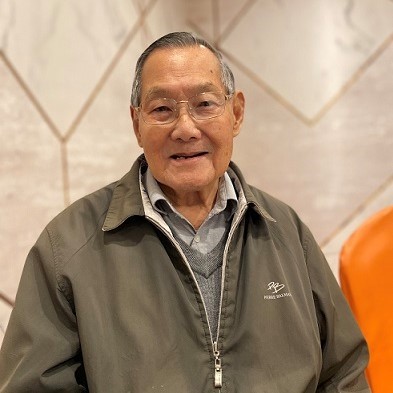
Trieu Nguyen doing some Vocations promotion in Brisbane went to the Sacred Heart Chinese Community Centre.
Trieu writes: in the last few days, I visited our brother Albert Chan who lives in the retirement village which is looked after by the sisters of St Paul de Chartres. Then he took me to the Sacred Heart Chinese Community Centre.
I met the new chaplain there. He is a Redemptorist who is Vietnamese Chinese.
I came to attend the mass with them on Sunday and was able to chat with them, and, of course, handed out the vocation promotion souvenirs. Then I joined them for the Corpus Christi procession at the Cathedral of Brisbane.
On Tuesday night, I had a chance to catch up with Albert again and Des Holm
for Albert's 61st priestly ordination anniversary.
This party was organised by Albert's friends, mostly Chinese.
It was a blessing for me to catch up with our brothers here, especially Albert and know more the foundation of the community.
We look forward to celebrating Albert's 90th birthday on November 15th
Feast of the Sacred Heart – Celebration of Heart of Life 40 years.
Feast of the Sacred Heart – Celebration of Heart of Life 40 years.
40 years directors, Brian Gallagher MSC, 1983 - and Clare Shearman, 2022-
About 60 gathered at the Heart of Life Centre in Malvern to celebrate the Feast of the Sacred Heart and 40 years of Heart of Life, established in 1983, staff, students, visitors.
Clare Shearman, the Director, welcomed everyone, acknowledging the owners of the land and affirming the MSC Chapter endorsing the Uluru, Voices from the Heart Statement.
The first item was the launching of the book continuing the History of Heart of Life 1983-2016, 2017-2022. Peter Malone was invited to speak on the highlights of recent history: vision, venues, directors, the centrality of the Siloam program for Spiritual Directors, noting that we have had more years of women directors than men!
Claire introduced Chris McPhee, Provincial Superior, who spoke of the recent history of Heart of Life and hopes for the future.
Chris presided at the Feast Day Eucharist.
Lunch followed,
the 40th Anniversary cake,
the screening of a video with pictures of the 40 years, prepared by manager, Susanah Tan – then a climax, the MSC and OLSH present singing the Ametur by Fr Tom Luby (which can be seen and heard on the Heart of Life Facebook page).

Brian Gallagher has produced a 40 years book of memories and testimonies from past staff and participants in the programs.
His book was launched by Kathy Cave, director of the Wellsprings Spirituality Centre – inviting Brian to speak of what Heart of Life has meant for him and those who have shared in the 40 years experience.
Claire presented Brian
and Chris McPhee with the first certificates for the Heart of Life Hall of Fame.
And some photos of those who gathered.
Including right Anne and Bernard Marmion, past participants, from Blackburn parish
Including left Jim and Adele Miller, past participants, members of Blackburn parish
Siloam full-time participants 2023, includiing our two Indonesian MSC, John and Petrus, our OLSH sister, Relida, from PNG, with Khoi who lecture next semester, and with their lecturer and tutor, Peter Malone. The students were the welcoming committee and worked in the kitchen and serving the lunch
Appreciation to Hoa MSC for the photos.
Celebrating the Heart of Jesus
Celebrating the Heart of Jesus
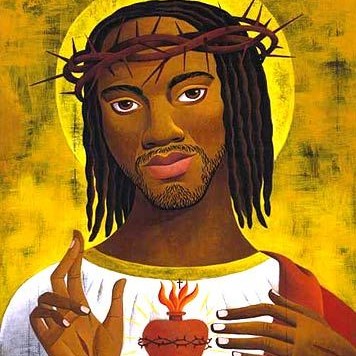
A variety of multicultural Sacred Heart images.
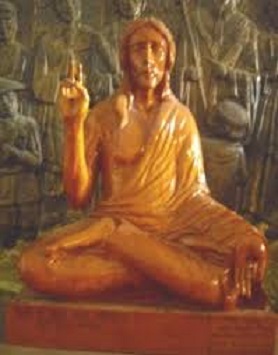
Vietnam
From the letter of Superior General, Abzalon, for celebrating our Feast:
At the beginning of this letter, I would like to take up a quote that Fr. Mauro Lepori, Cistercian Abbot General, used to encourage us as Religious to strengthen our charismatic identities, "I remind you to revive the charisma of God, which is within you" (2 Tim 1,6). Based on this, we feel encouraged to invite all of you to live this Feast Day hearing the call to rekindle the MSC Charism and Spirituality that is within each of us.
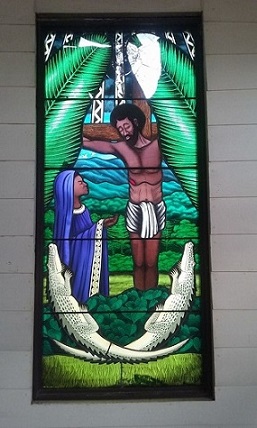
PNG, Kerema
On this Feast Day we suggest reflecting on the meaning of the term 'revive'. This word comes from the Greek which is very significant. It could be translated as "renewing life to the fire" or "giving life back to the fire".
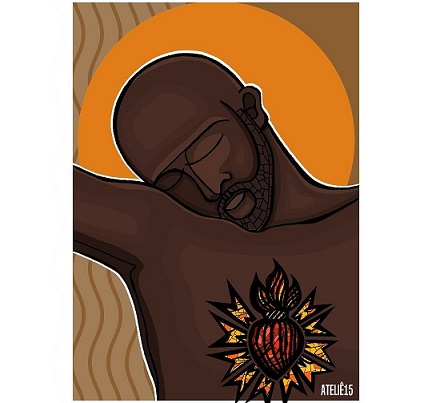
Brazil
It contains the concepts of renewal, life, and fire. It would imply the idea of resurrection, but also that of a fire that is already there, and that at certain times needs something to rekindle it.
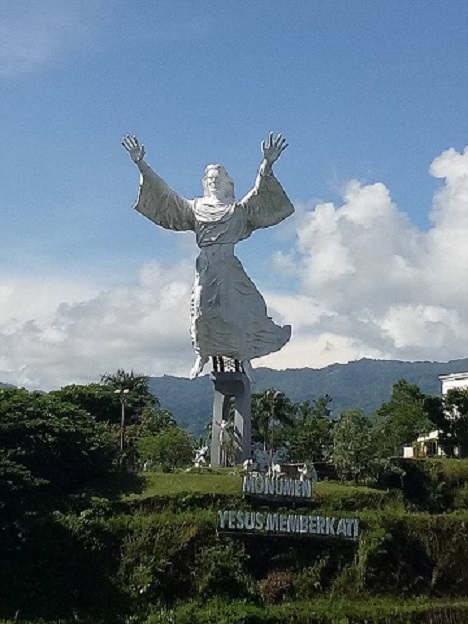
Indonesia, Manado
We are all too aware of the reality of war in our world today, the destruction of Mother Earth, and the victims of all kinds of abuses that continue. All these, and many other realities, are today's ma! moderne that need the healing love of God. There is a great challenge even within our own congregation to put into practice an authentic and dynamic Spirituality of the Heart.
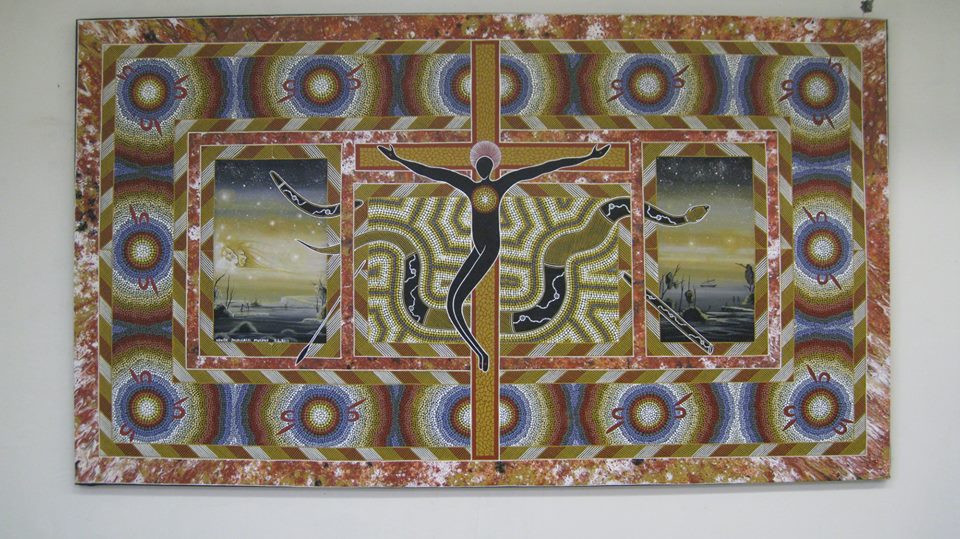
Australia, Northern Territory
Therefore, now more than ever, given what is happening in the different countries where we are present, we must engage in this task of rekindling the fire - transformation, and updating - of the MSC Charism. We invite you not to be discouraged or to lose hope when you see that attempts in this rekindling have not achieved what was desired.
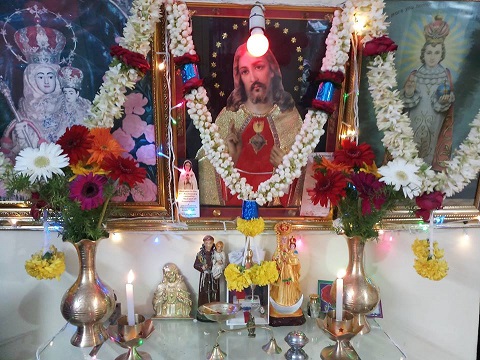
India
We also commend to the Heart of Jesus all those confreres and people of God who continue to be signs of life in challenging situations, in conditions of war, insecurity, high risk, walking alongside many victims, and even endangering their lives. We also pray for all the complex and challenging situations faced within MSC communities and entities.

May Our Lady of the Sacred Heart help us to know the tender, prophetic, and missionary presence of Jesus, who makes this journey with us.
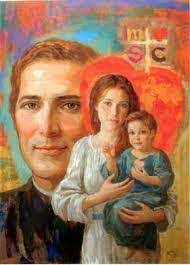
Jules Chevalier Bicentenary - 15th of each month reminder
Jules Chevalier Bicentenary - 15th of each month reminder
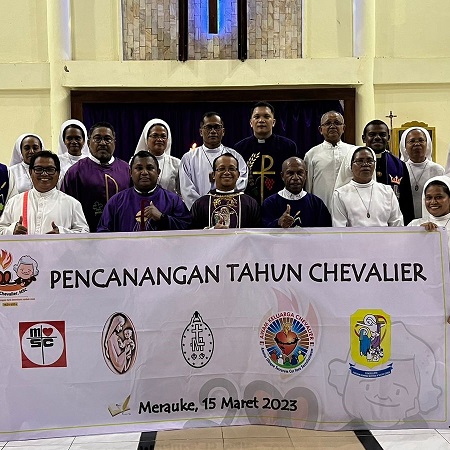
Each 15th, an alert to the Bicentenary of Jules Chevalier’s birth, March 15th 2024. We have featured photos of Via Asmara and the inauguration of the year.
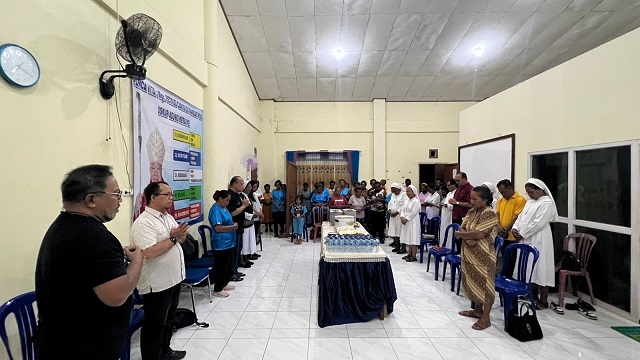
This month we have some photos from the Indonesian Province and the opening of the Bicentenary in Merauke, Irian Jaya/ Western New Guinea.
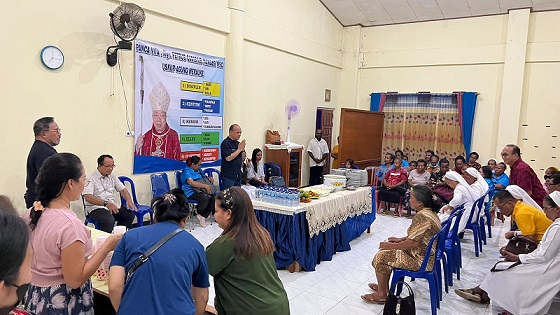
A Chevalier family celebration,
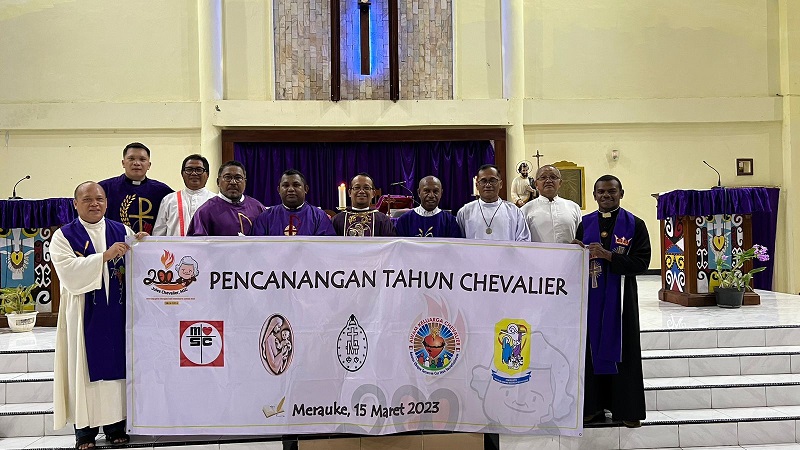
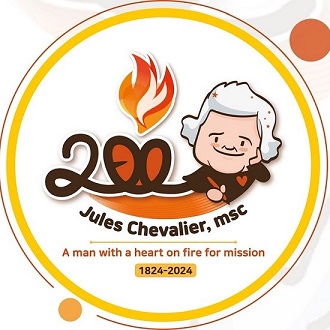
Remembering Brian Carroll MSC ….. one of our (very) quiet achievers!
Remembering Brian Carroll MSC ….. one of our (very) quiet achievers!
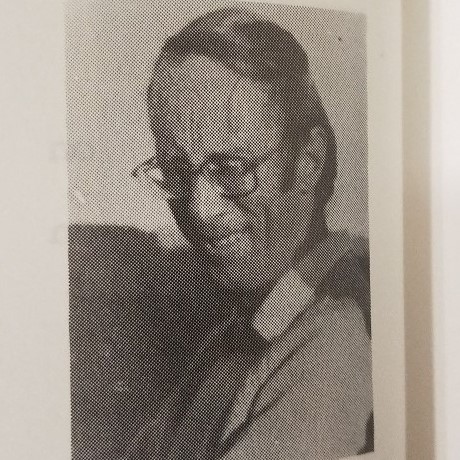
Terry Herbert writes: As a close friend, confidant, and teaching companion of Brian, I’m immensely grateful to have known him for just three years when we were on Staff at Chevalier College, 1975 - 77.
Brian’s mother died when Brian was aged 7; with his father Clem, they moved to Orange, where Clem was Stationmaster. This may account for Brian’s intense interest and extensive knowledge of trains, both in Australia and worldwide.
One of the Hobby Club’s at Chevalier, was Brian’s Train Group, where he would “take” the students on (for example) one of Europe’s great train journeys, intimately describing the train decor, dining menu, loco details, etc. with passion and enthusiasm. This same spirit coloured his teaching … not unlike Keating of Dead Poet’s Society.
Brian was known for his very quiet presence … the student boarders aptly nicknamed him “Casper, the friendly Ghost”. He was known for his patience, and cheerfulness, good humour, and especially his exceptional ability to listen deeply to people, and emphathise with them with compassion . That was not missed by the student boarders at Chevalier. One Obituary note read: “no girlfriend, no problem was too big for Fr Brian”.
I experienced Brian’s patient listening one morning close to 9am. Brian was on a verandah near our dining room, probably reflecting on his next class, when I asked him if he had a moment to help me with a few ideas on a Religion Class topic. Brian strolled over, seeming to have all the time in the world, offered me some ideas, and asked gently, “is that OK” with no sign of rushing. I later learned he (also) had a class to teach at 9am!
Brian became progressively exhausted, and some thought he was having a breakdown; he was advised to take a break, and was having a meal with his father up country, when he said: “that was a good meal, Dad … like the one we had in South Africa”! They’d never been there. Another medical opinion was sought; a woman specialist “twigged” and suggested a brain scan …. a large tumour was found at the back of his brain, and next to his spinal column… inoperable for obvious reasons. That was early 1978. I had moved to Monivae College,Victoria. end of ’77.
Brian died peacefully on 11 June 1978, aged 37 years. Like all our close friends, I (too) look forward to reuniting with him in the New Creation.
….. Terence Herbert MSC
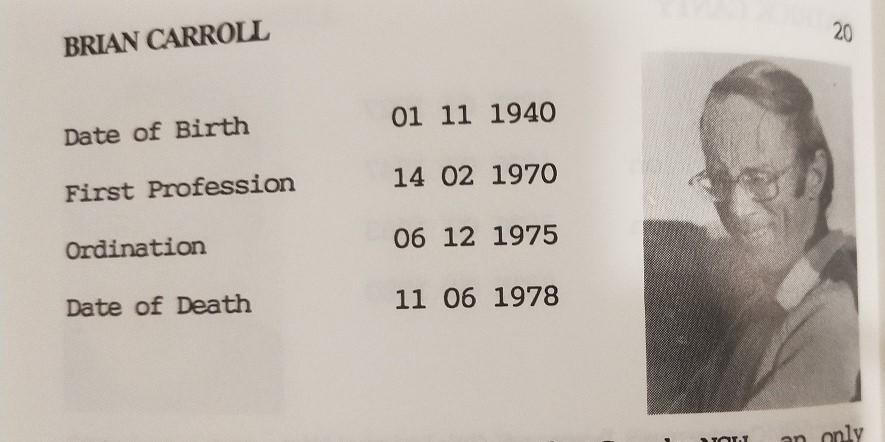
Postcard Killings, The
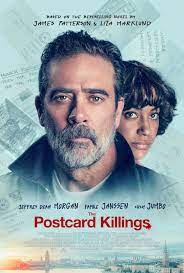
THE POSTCARD KILLINGS
UK/US, 2020, 104 minutes, Colour.
Jeffrey Dean Morgan, Famke Jensen, Cush Jumbo, Joachim Krol, Steven Mackintosh, Denis O'Hare, Naomi Battrick, Ruairi O'Connor, Eva Rose, Dylan Devonald Smith, Sallie Harmsen.
Directed by Denis Tanovic.
Interest in the film as a version of a novel by James Patterson, the popularity of Patterson’s novels over the decades – commanding a wide audience.
This is an international story, espionage, murder mystery, police procedures, and a contrast between the American approach, direct, shoot first, and the contrast with international investigations. A great deal is made of the postcards, of works of art, the design, international, codes.
Jeffrey Dean Morgan is the American investigator, trying to find out the truth about the death of his daughter on holiday in Europe. There is a range of American and British actors in supporting roles.
In itself, plenty of action and intrigue. But, for readers of James Patterson’s novels, perhaps a bit too violent for their tastes.
The film was directed by Dennis Tanovic whose No Man’s Land won the Academy award for Best Foreign language film. His films include popular thrillers like this one as well as arthouse films with Eastern European sensibilities.
- The title? The international killings? The use of the postcards, the pictures of the works of art in galleries, the city locations, the continued messages and themes? From a James Patterson novel?
- The range of international settings: the detail of London, visits to Madrid, the detail of Stockholm, visit to Munich? Brussels? The scenes in the United States, New York, apartments, the mansion, grounds, the prison? The musical score?
- The film as a murder mystery? Police procedural, differences in different countries? The American approach, shoot first and then ask questions? International reaction to the American detective, his presumptions, his demands, arrogance even making allowances for grief?
- The situation, the honeymoon couple, the graphic visuals of torture and death? The succeeding couples? The poses, like the works of art? Then the postcards and the statements?
- Following the grief and investigations of Jacob Kanon? Presence in London, the discussions in London, his frustration with Pearce, Pearce doing his job, classified information? The meeting with other police? The sympathy of the German officer, giving information, supplying the photos, the walks and discussions? The Swedish authorities? The authorities in Brussels?
- Jacob Kanon, the scene in the airport, the demands to go to Spain, the ugly American? His travelling to the other countries, making contact? The information from the journalists who receive the postcards? In Stockholm, tracking Dessi, her resistance, learning the story, meeting with Jacob? The discussions, the clues, building up the picture, her writing the article?
- Valerie, coming to London, her grief and outbursts against her husband? The flashbacks for the wedding? Her resenting her husband sending the couple to Europe? Her going back to the US, the phone calls, her making investigations, the discovery about the identity of the young couple, their millionaire father, the son informing on him, his imprisonment? The neighbours and their chat? Her information, going to the prison to interview Simon?
- The Randolphs, young, on the train, enjoying Europe? The football crowd, Pieter and his appearance, conversation, getting the drinks? The screenplay setting him up as the killer? The couple avoiding him? His seeing them in Stockholm, the discussions about where they were staying, Peter and his wife, her artwork, his many tattoos? Their going for the cruise?
- The shock to discover Pieter and his wife murdered? The impact of the twist?
- The focus on the young couple? Taken by the police, Sylvia having an answer for everything, keeping the receipts? Mac, the interrogation? Seeing them together, the hotel, the disguises, leaving Stockholm?
- The revelation about the truth, the investigations, their not having any back story? The revelation about Simon, the financial deals, Mac as the missing son? Sylvia as the older daughter? The flashbacks, the harsh treatment by their father, aesthetic, boarding school, knowledge of the arts? The suicide of their mother? Their art knowledge, the postcards, the posing of the bodies, the literary allusions? The issue of incest? The revelation that both were adopted?
- Jacob, the continued pursuit, the taking of Dessi, crashing the car? Jacob in the lift, the truck, finding the car, the couple and their talking with Dessi, the build-up to her death, Jacob and the confrontation, Mac wounded, his sister taking him into the snow?
- Jacob of the German officer, their friendship, his retirement? The return with the body? The funeral? Jacob and Valerie reconciled?
- The twist with the postscript, Simon and his phone call – and his daughter still alive?
Oslo

OSLO
US, 2021, 118 minutes, Colour.
Ruth Wilson, Andrew Scott, Salim Dau, Jeff Willbusch, Igor Naor, Sasson Gabay.
Directed by Bartlett Sher.
Oslo is a television version of a play by J.T.com Rogers, which won Tony Awards on Broadway. This film is directed by the Broadway director, Bartlett sure.
The title indicates that this is a film about the peace discussions in the early 1990s and the intervention of Norwegian diplomats. It resulted in the Oslo Peace Accord and a meeting at camp David between the PLO, Israelis with Pres Bill Clinton.
For audiences interested in the decades-long clashes between Palestinians and Israelis, this can be illuminating viewing, the acknowledgement of the hostilities, Yasser Arafat and the PLO, the seeming impossibility of us to two-state solution, the continuing intifadas.
Ruth Wilson and Andrew Scott play a Norwegian couple, she a diplomat, he working on a foundation.
The film shows the various stages of initiatives for peace discussions, the inherent difficulties, the clashes, the work behind the scenes, the work of non-politicians, contact with the politicians, contact with Arafat. Which means that there is quite a lot of dramatic tension throughout the film.
While the Oslo Peace Accord was a landmark in the early 1990s, it enabled Palestinians and Israelis to imagine a peace accord even if in the following years, Rabin was assassinated, intifadas continued, prejudices and bigotry continue along with assassinations, suicide bombers, rocket retaliations.
- The original play, Tony Awards? The director, his stage experience, transferring the play to the screen? The playwright and his screenplay?
- Audience knowledge of the peace discussions in the early 1990s, the Norwegian attempts, the more public attempts, the Oslo Peace Accord, the camp David meeting with the PLO, Israeli politicians, President Clinton?
- The continuing relevance of this subject? The information at the end, the peace accord, the assassination of Rabin, the various uprisings?
- The comment about the present and being obsessed with the past, going back over the grievances, the hostility? Possibilities for looking to the future? Even to Israelis and Palestinians meeting personally?
- The facts of the events, fictionalise in a drama, the contact between the playwright, the director and the main negotiator, Terjri, his wife, Mona?
- The initiatives by Terje and Mona? His entrepreneurial skills, discussions with the Israelis? Mona, her Parliamentary position, the discussions with the PLO?
- The visual motif, the scenes of war, the UN, fighting in the streets, explosions, Mona and her memories, her dreams, walking through these? The impact of the young Israeli with his gun, the young Palestinian with his bomb? Symbol of the conflict – fearful, unwilling?
- The work of the couple, husband and wife, the contacts, the skills, Mona and her diplomacy, Terje and his having to be discreet? The invitations, the arrangements, airport, inconspicuous car, travelling through the Norwegian countryside, the mansion, the grounds, the interiors? Rooms, dining and relaxing, the discussion room?
- Sequences outside the mansion, political discussions, meetings in Israel?
- The PLO representatives, Qurei, personality, years out of Palestine, Tunisia? Relationship with Arafat? Talking with Mona, his agreement? His assistant, severe, both not having met Israelis before? Their wariness?
- The Israeli professor and his assistant, more genial?
- The film dramatising the various meetings, the initial suspicions, going into the room, the beginnings of the discussions, stances, tensions? Philosophical and political differences? The contrast with the meals, the cook and her explanations, the enjoyment of the meal, relaxing, talking? Telling stories, about their parents? Attempts at telling jokes?
- Mona, the Norwegian officials, wary, not telling the minister till later, eventual communication? The political steps, secrecy? Terje and his working with the Israelis, the discussions, assuring the agreement of Simon Péres before he did? The PLO ringing Tunisia – and the security guard revealing that he did not ring but waited and then returned?
- The arrival of the Israeli negotiator, his personality, background, manner? Tensions, agreements, meals?
- Joel Singer, presence, manner, assurance, lawyer? His role in the past in government advice, military? His domination, the discussions? To-ing and fro-ing? The possibilities for success, the draft agreements, Mona and Terje typing all night, tearing up of the drafts? Eventually reaching draft status?
- The Israelis, the discussions with Péres? The return, the 200 questions, the practical issues of the governing of Jericho, collapse, Mona, the speech, offering them the possibilities for the future, the return? The phone calls, non-phone calls to Tunis? Péres and concessions?
- The movement towards agreement, the meeting in Stockholm, the formal gathering, the dominating woman enclosing the kitchen, the photocopier? Mona and Terje and their work, Péres, having to do the deal by phone, not meeting personally, contacting Aquire, Arafat himself?
- The achievement, the work of the couple, behind-the-scenes, shrewd, entrepreneurial, diplomatic?
- The final sequences of the signing of the Oslo Accord at the White House?
- The value of this kind of drama, behind-the-scenes, making it more real?
Toni Takitani/ Tony Takitani
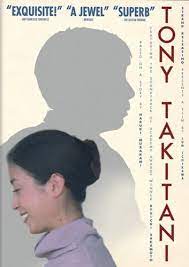
TONY TAKITANI/ TONI TAKITANI
Japan, 2004, 85 minutes, Colour.
Issei Ogata, Rie Mayazawa, Shinohara Takahumi, narrated by Hidetoshi Nishihijima.
Directed by Jun Ichikawa.
New York Times describes this film: "A delicate wisp of a film with a surprisingly sharp sting"
The central character, Tony Takitani, is seen as a boy, his growing up, as an adult. But the film opens showing his father, a jazz musician, before the war, imprisoned in China, harsh treatment, surviving and released. He then travels, neglecting his son.
This is also the portrait of a young man growing up after World War II in Japan, talented, technical design, his work. He is attracted to a young woman who declines his offer and marriage but then changes her mind. The story is quite idiosyncratic in showing the wife’s love for shopping, buying excessive clothes, a room in the house just for her clothes. Just as she returning some clothes to a store, she is killed in a car accident on the street.
The last part of the film is Tony’s eccentricities, hiring young woman as long as she wore his wife’s clothes – but she declines. Than an encounter with a man who had been involved previously with Tony’s wife. Then his father dies.
Tony keeps his father’s trombone, his wife’s clothes – but eventually sells them, a life of many disappointments.
- The title, the focus on Tony? As a boy? Growing up? Adult? His relationship with his father? His profession? The attraction to the young woman, marrying her? The consequences and her extravagance?
- The setting, the initial visuals of Japan, pre-war, the war, aftermath? The context for Tony’s father, jazz musician, career, China, survival, woes? Neglect of his son?
- The portrait of the boy growing up, postwar Japan, the boy, education, talents?
- Adult Tony, technical design, his work, a loner, the attraction of the young woman, fashion, the dresses, her obsession? Tony marrying her, the consequences?
- The wife, younger, shopping, extravagance, leaving?
- Tony, in middle age, life experiences, disappointments, persevering?
Ip Man 4, the Finale
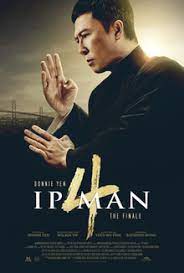
IP MAN 4, THE FINALE
Hong Kong/China, 2019, 107 minutes, Colour.
Donnie Yen, Scott Adkins, Danny Kwok-Kwon Chan, Kent Chen, Yue Wul, Chris Collins, Vanda Margraf.
Directed by Wilson Yip.
This is the fourth in the series of portraits of Ip Man, directed by Wilson Yip. Audience response has been varied, some disappointed in the later films, the audiences wanting much more action. Others interested in the career and life of Ip Man, and especially of his legacy, his dignity, and a visit to the United States in the 1960s – and the themes of American bigotry against the Chinese (some commentators thinking that this was over down in this film).
Donnie Yen continues his performance as Ip Man, ageing, a strong reputation, admiring students but with rebellion at home, his teenage son not wanting to study at his father’s urging, upset at the death of his mother, refusing communication with his father. A delegation comes from the United States, from Bruce Lee, to invite Ip Man to a martial arts tournament. He accepts the invitation, even after hearing the diagnosis of his cancer. He also intends to find a school in the United States for his son, relying on referrals and letters of recommendation, especially from the Chinese Board in San Francisco. He appears before them, they are hostile to the idea of communicating Chinese martial arts beyond Chinese and there is a clash between it man and the head of the board, Wan.
Ip Man visits to school, has discussions with the principal, needing a letter of recommendation from the Chinese Board but the suggestion that he give $10,000 to support the school and become a member of the Board. He also encounters the daughter of the head of the Chinese Board, bullied at school, Ip Man defending her – and the consequences for an angry American girl, bigoted, complaining to appearance, enlisting the help of her father who works for immigration and who organises a raid on the Chinese Board, taking Wan as a prisoner.
On the one hand, there are fights throughout the film to satisfy the martial arts audience, especially fights between Ip Man and Wan and, finally, a climactic fight with the bigoted American Marine.
On the other hand, there is reconciliation with his son and the promise to teach him martial arts and not insist on his going to the US. The film ends with the son filming Ip Man and his techniques so there will not be lost. And, before the final credits, a collage of scenes from the previous films, a resume of Ip Man’s life and career.
And the information that the American marines have incorporated the Chinese techniques into their training.
- Audience knowledge of Ip Man, his life, career, martial arts, family? The four films in the series with Donnie Yen, the finale?
- The Hong Kong settings, the 1960s, homes, martial arts schools? The United States, San Francisco, Chinatown, the Chinese community, costumes, decor, the martial arts settings? The Marines, training, fighting locations? The musical score?
- Donnie Yen as Ip Man, the four films, changes, ageing, personal life, relationships, the schools, the students, the clashes, competitions, Bruce Lee, Bruce Lee in the United States, the invitation for Ip Man to come to America for the tournament? His clashes with his son, his son’s rebellion? The demanding father, better education? Friendship with Bob, Bob caring for Jin, the nightly phone calls, Ip Man and his attempts to find a school, letters of recommendation, clashes with the head of the Chinese Association, defending his daughter from bullying?
- Ip man and his reputation, the Chinese martial arts and their skills, seeing them in action? The fights throughout the film? Ip Man fighting with Wong? The American Marines, the clashes, karate versus the Chinese martial arts, the American Marines, the fights?
- Themes of Chinese-American relationships, the 19th century, the goldrush, the building of the railways, the prejudice against the Chinese? 20th century, San Francisco, American superiority, condemning Chinese inferiority? Superiority over the traditions, the martial arts? The Sergeant Major, the American champion, bigotry? Department of immigration, targeting the Chinatown community? The dialogue for the film, expressions of bigotry, Chinese pride?
- Ip Man son, age, death of his mother, rebellion, not wanting to study, surly to his father, not answering the phone, Bob making demands on him? Bob telling him about the cancer, the boys weeping, talking on the phone, his father’s return, the reconciliation and apologies, the boy wanting to study Chinese martial arts, his father instructing him, filming the moves so they would always be available?
- Ip Man, his age, the doctor, the cancer? His surviving for several years, death in 1972?
- The Chinese community in America, the numbers, wanting to be exclusive, Wan and his severe rule, the meeting with Ip Man, the committee, Ip Man and his defiance, making the Chinese martial arts available beyond China, the role of Bruce Lee? The refusal to write the letter of recommendation?
- Ip Man visiting the school, the principal, the suggestion of giving $10,000 and becoming a member of the board?
- The owner, school, the cheerleaders, her success, Becky’s jealousy, Becky and the bullying, taunts, the young men, brutalising Yonah? Ip Man’s arrival, the confrontation, defeating the young men, their fleeing? Becky at home, complaining to her mother, the mother’s phone call to the father, his return, Department of immigration, discussion with the Marines, the raid, the African-American policeman (and his initial visit to Hong Kong and the encounter with Ip Man and the students, fighting them, the invitation for Ip Man to come to the US)? The warning about the raid, the arrest of one, imprisonment? His being handed over to the Marines?
- Yonah, affection for Ip Man, forging the letter for the school, his tearing it up, wanting honesty? His encouraging her in her ambitions?
- Bruce Lee, student in Hong Kong, coming to America, the schools, his students? His role in this film, in the 1960s, Seattle and his school, moving into the media? His fight sequences?
- The Marines, the challenge to Wan, the fight, defeating him, making the Marines applaud, Wan taken to hospital?
- The information for Ip Man, the defeated Chinese, Ip Man arriving, the Marines watching, the fight with the Sergeant Major, the ups and downs of the fight, Ip Man and his superiority?
- The final information, the collage of sequences from the previous films and outlining Ip Man’s life and career? And the acceptance by the American forces for Chinese martial arts and their incorporation into training programs?
One Fine Morning/ Un Beau Matin
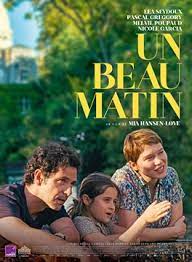
ONE FINE MORNING/ UN BEAU MATIN
France, 2022, 112 minutes, Colour.
Lea Seydoux, Pascal Greggory, Melvil Poupaud, Nicole Garcia, Camille Laban Martins, Fejria Deliba.
Directed by Mia Hansen-Love.
International audiences have come to look forward to films by writer-director, Mia Hansen Love. Her stories are very humane, portraits of sympathetic characters, characters in conflict, probing deep human relationships.
And this is the case here. The focus is on Sandra, a very strong and persuasive performance from layers say do. But, in fact, there are two focal gazes at Sandra. The first is her relationship with her ageing father, a philosophy professor, his health is deteriorating, physically, mentally, his becoming more confused, blind, in need of care. The father is played by veteran actor Pascal Greggory. The father, Georg, has been divorced for 20 years but his ex-wife, Nicole Garcia, still shares responsibilities for him, along with his companion of five years, Leila, Fejria Deliba. However, Sandridge seems to take responsibility as a major carer, constantly visiting her father, becoming involved, along with her mother, for finding the best place for her father’s care – which includes visits to hospitals, interviews with doctors, interactions with carers, visits to aged care facilities, not without stress on each member of the family as well is adding to the confusion and deterioration of the father.
This theme would be a film in itself.
However, there is another major focus, this time with Sandra herself, a single mother, devoted to her daughter (who can be wilful at times), primary school age. The film offers many scenes between mother and daughter. However, this is also the story of love-affair. Sandra encounters a past friend, a friend of her daughter’s father (absent from the film), Clement, Melvil Poupaud, who describes his scientific career as a Cosmo-chemist, collecting from all around the world particles from outer space and analysing them. There is a visit to his working centre and his vast machine for analysis. But, Sandra is passionately in love with him, many meetings, intense, her daughter befriending Clement and enjoying his company. However, we see Clement initially with the son so we know there are complications, that he is married.
Mia Hansen-Love is able to combine the two major strands of her story, the audience identifying with Sandra, empathetic with her devotion to her father, wondering, questioning about the ultimate resolution of the affair.
This is a very French film in its sensibilities, in greatest portrait of characters and relationships.
- The title, the later reference to one of Georg’s books? The ending and the sunshine?
- French sensibility, characters, situations, relationships? Ageing, care? Marriage, failures, sexual relationships? Children?
- The city settings, streets, driving through Paris, hospitals and aged care homes, apartments, school, outings? The musical score?
- The focus on Sandro, Leo’s sake do and her presence, performance? Age, at home with her daughter, taking her to school, to the doctor…? The past, Lynn’s father? Her relationship with her mother? With her sister? Aunt? Her relationship with her father, care for him?
- Georg, his background, Vienna, library, his marriage, divorce, professorship, philosophy, his companionship with Leila for five years? His deteriorating health? Physical, mental, confusion? Blindness? Sandra and her care, her visits, his dependence on her? His memory slipping? His wife, her visits, taking responsibilities? His sister, his other daughter? His health situation, leaving home, packing up, the library and those taking the books? The hospital, the doctors, the nurses, visiting the aged care homes, the elderly, wandering, meals, sing songs? Is finally settling?
- Sandra, her relationship with Lynn, love and care, Lynn and her wilfulness, contradicting her mother? The encounter with Clement, Lynn relating well to him, the outings? The frank discussions about the relationship? The bed seen? Her limp, the doctor, growing pains?
- Sandra and her mother, 20 years of the divorce, her mother and her protesting, the various campaigns, narrating her stories, arrests, causes?
- Clement, is signs, travels, cosmo-chemist, the visitor’s office, the vast machine? Friendship with Sandra, friend with Lynn’s father, Clement and his marriage, his son? Taking up the relationship with Sandra, the effect on her, in love, intense, preoccupation, his response? It is marriage, his son? The pauses, his communications, going back to his wife? The effect on Sandro? His coming back, decisions, the story of the holiday on the Amalfi coast, the audience not seeing it? Only the result?
- The audience identifying with Sandra, as a daughter and her concern about her father, her help? As a mother, her care for Lynn? Her relationship with her mother? Her relationship with Clement, intense, disappointments, weeping? The final happiness?
- The impact of the film, audience response to the two major themes, aged care, personal love and relationships?
